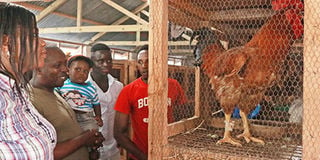My secret to raising 7.2kg cocks, 5kg hens

Farmer marvel at the 7.2 kg bird at the Mombasa Agricultural Show. The bird emerged the best kienyeji improved chicken. PHOTO| WINNIE ATIENO|NMG
What you need to know:
- People keep birds for different reasons, but if it is for commercial purposes, it does not make economic sense to keep a 7.2kg bird but the good thing is that it can win at the show
- For healthy birds, Kazungu further urged farmers to ensure their birds drink sufficient clean water.
- A normal Kienyeji bird weighs an average of 3kg when about a year-old.
It did not come as a surprise for Francis Kazungu, who has been keeping chickens for seven years, when his cock was declared the best Kienyeji improved chicken at the recently held Mombasa show.
Kazungu is used to winning. In 2017, for instance, the resident of Shigharo in Taita Taveta saw his bird declared the overall champion at the show.
His winning cock this year was a crossbreed of Kari Kienyeji bird and Kenbro, weighing 7.2kg. He later sold the bird, which was one of the eight he ferried to the show, for Sh10,000.
“The bird was 10 months old and was the heaviest of my 50 Kienyeji improved chickens. The hens weigh up to 5kg,” said Kazungu, who started keeping poultry in 2012 to fend for his family.
So what is his secret to rearing heavy birds? “I keep my birds organically. I don’t vaccinate them but every three months, I offer them crushed aloe vera or pepper mixed with water to keep diseases at bay.”
Commercial rotation
He does not offer his birds commercial rations, but formulates his own feeds, which he cooks before feeding them.
“I mix maize germ, sukuma wiki or cabbage and sorghum then boil and cook like ugali before feeding the birds. This makes digestion easier and helps in their weight gain,” said Kazungu, who free-ranges his chickens but does not allow them to mix with those of his neighbours.
In a month, he sells at least five hens and three cocks at between Sh2,000 and Sh8,000 each and some 100 fertilised Kienyeji eggs at Sh25 to locals.
Kazungu also grows maize, beans, sweet potatoes and cassava on an acre.
“I don’t buy commercial feeds, I get everything from my farm, cutting down on expenses. I was elated to win in that category. I called my family who help me in keeping the chickens to break the good news,” said the farmer, who does not use any antibiotics on his birds.
Gigantic birds
At his stand during the show, tens of farmers and students milled around him, eager to see his gigantic bird.
“I sell each cock at between Sh2,500 and Sh8,000 because they weigh from 6kg to 7.5kg. They are my source of income; they feed my family and school my children. If you want to excel in this sector, ensure your birds feed well, maintain high standards of hygiene and keep diseases at bay,” he told his audience.
For healthy birds, Kazungu further urged farmers to ensure their birds drink sufficient clean water.
Dr Godrick Mwaringa, the Malindi sub-county veterinary officer, said organic poultry farming requires strict management to keep diseases at bay since one will not use drugs.
Dr Mwaringa, however, warned against failing to vaccinate birds, noting this can lead to spread of diseases.
“Unless he keeps the birds in isolation, then vaccination is necessary to curb interaction with people and other birds. People who visit the farm must also disinfect their feet thoroughly to ensure birds are safe from diseases,” added the expert.
Winning the show
He agreed that cooking for the birds reduces digestion periods.
“People keep birds for different reasons, but if it is for commercial purposes, it does not make economic sense to keep a 7.2kg bird because demand for such a bird is very low, but the good thing is that it can win at the show and it also brings you honour,” Dr Mwaringa said.
The veterinarian said a normal Kienyeji bird weighs an average of 3kg when about a year-old.
Gumboro, fowl typhoid and Newcastle are the main diseases that affect chickens, he noted.





